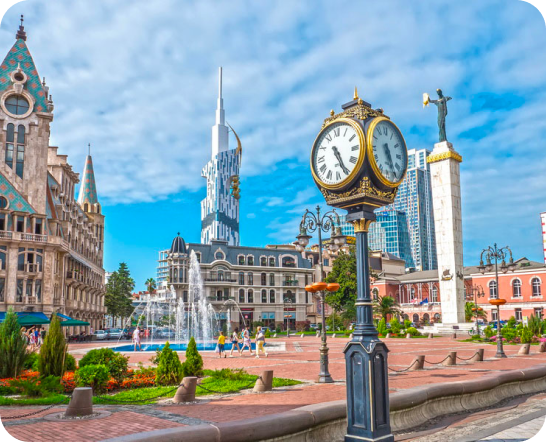Fisheries
General information
Situated along the eastern coast of the Black Sea, the Republic of Georgia holds a pivotal geopolitical position at the crossroads of Europe and Asia. The country's 310-kilometer coastline plays a crucial role in shaping its strategic importance in the region. Georgia's ports, such as Batumi and Poti, serve as vital hubs for trade, facilitating the movement of goods and contributing to economic connectivity. The Black Sea coastline is integral to Georgia's energy security, hosting key infrastructure like the BTC pipeline, which connects the Caspian Sea to the Mediterranean.

Tourism along the Black Sea is a significant contributor to Georgia's economy, with cities like Batumi attracting visitors to its beaches and cultural attractions. However, the region also faces security concerns, particularly given Georgia's proximity to Russia, as demonstrated by the 2008 Russo-Georgian War. The Black Sea serves as a conduit for Georgia's aspirations for European integration, aligning with EU initiatives like the Black Sea Synergy.
The Republic of Georgia, situated at the crossroads of Eastern Europe and Western Asia, holds a strategically important position on the eastern coast of the Black Sea. The country's coastline stretches for about 310 kilometers along the Black Sea, playing a crucial role in shaping its geopolitical and economic dynamics. Here are some key aspects of the Republic of Georgia in terms of the Black Sea perspective:
|
Geopolitical Significance Georgia's Black Sea coastline positions it as a key player in the broader geopolitical landscape of the region. It serves as a gateway connecting Europe and Asia, making it a vital transit corridor for goods, energy resources, and transportation. |
Trade and Transportation The Black Sea has historically been a major trade route, and Georgia's ports, such as Batumi and Poti, are essential hubs for the transportation of goods. The country's maritime infrastructure facilitates the movement of cargo, enhancing regional trade and economic connectivity. |
Energy Security Georgia's Black Sea coast is integral to the region's energy security. The Baku-Tbilisi-Ceyhan (BTC) pipeline, connecting the Caspian Sea to the Mediterranean, traverses Georgia, providing a key route for the transportation of oil. Additionally, the Southern Gas Corridor, including the South Caucasus Pipeline, contributes to the diversification of energy sources in Europe. |
|
Tourism and Recreation The Black Sea coastline is a significant factor in Georgia's tourism industry. Coastal cities like Batumi attract visitors with their scenic beaches, cultural attractions, and a thriving nightlife. Tourism contributes to the country's economy and helps strengthen cultural ties with other Black Sea nations. |
European Integration Georgia, aspiring to strengthen its ties with the European Union, sees the Black Sea as a conduit for deeper integration. The Black Sea Synergy, an EU initiative, aims to enhance cooperation among countries bordering the Black Sea, fostering regional stability, and promoting economic development. |
Environmental Considerations The Black Sea faces environmental challenges, including pollution and overfishing. Georgia, as a Black Sea littoral state, is involved in regional efforts to address these issues through collaboration with neighboring countries and international organizations. |
In conclusion, Georgia's position along the Black Sea is a key determinant of its geopolitical, economic, and security dynamics. The country actively engages with regional and international partners to leverage the strategic importance of its Black Sea coastline for mutual benefit and shared prosperity.





